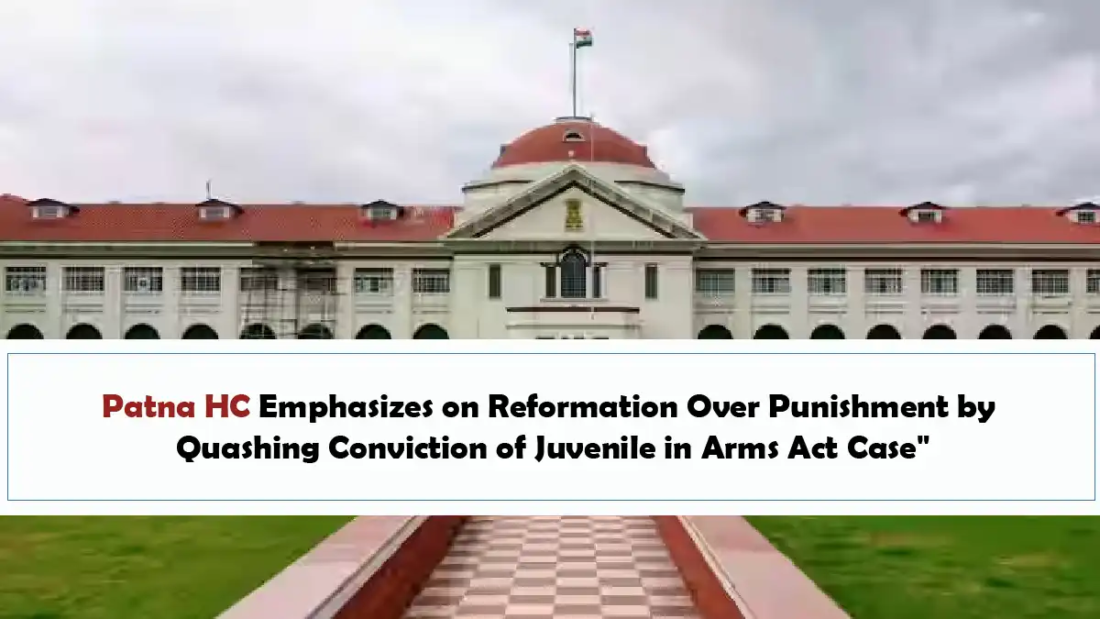Facts of the Case
The matter before the Patna High Court concerned a juvenile petitioner who had been convicted under the Arms Act and sentenced by the Juvenile Justice Board to three years in a Special Home. The petitioner, aged nearly 17 at the time of the incident, was apprehended by the police along with two others, allegedly in possession of illegal firearms. This conviction was later upheld by the Sessions Court. However, the petitioner challenged the legality and fairness of both the conviction and sentence. The case involved not only factual scrutiny of the alleged recovery of arms but also the judicial approach to juvenile justice, particularly in the light of the principles enshrined in the Juvenile Justice (Care and Protection of Children) Act, 2000 (JJ Act) and the Juvenile Justice Rules, 2007.
Contention of the Petitioner
The petitioner argued that the prosecution had failed to establish beyond reasonable doubt that he was in possession of any arms. He relied heavily on the testimony of one of the seizure witnesses who categorically denied being present at the scene of the alleged recovery and claimed he had merely visited the police station for a character certificate and was coerced into signing a blank document. Additionally, the petitioner submitted that the seizure process lacked transparency and procedural integrity. There was no evidence that the arms and ammunition were sealed on the spot or that proper protocols were followed. The petitioner also contended that his good conduct, academic performance, and clean social background were disregarded by the Juvenile Justice Board when imposing the sentence.
Contention of the Respondents
The prosecution stood by the findings of the Juvenile Justice Board and the Sessions Court. It asserted that the petitioner, along with his co-accused, was apprehended with illegal firearms and that the seizure was valid. The authorities argued that the sentence passed was within the framework of Section 15 of the JJ Act, 2000, which allows for placement of a juvenile in a Special Home upon being found guilty. They maintained that the petitioner had been lawfully convicted, and that no miscarriage of justice had occurred. However, there was insufficient rebuttal or clarity provided by the prosecution regarding the inconsistencies in the seizure process or the Social Investigation Report that spoke in favour of the petitioner.
Court’s Observations
Justice Jitendra Kumar, while delivering the judgment, took a strong reformative stance grounded in the objectives and spirit of the JJ Act. He observed that the legislation is not punitive but rehabilitative in nature, aimed at protecting children who come into conflict with the law. The Court emphasized that a punitive approach towards juveniles is not only contrary to the law but also self-destructive for society. The judgment reiterated that children must be reformed and reintegrated, not punished, and that society cannot afford to criminalize its youth.
The Court found grave inconsistencies in the prosecution’s evidence, particularly the lack of credible proof regarding the recovery of arms. It noted that the seizure witness had denied the recovery in his presence and the arms were allegedly sealed together in one sack, with no identification as to which items belonged to which accused. Such lapses rendered the prosecution’s case doubtful.
Importantly, the Court highlighted that the Juvenile Justice Board had not considered the Social Investigation Report, which clearly indicated that the petitioner was of good character, had no criminal antecedents, and was academically inclined, scoring 75% in his matriculation and aspiring to pursue B.Tech in Chennai. The Court expressed concern that the juvenile’s interests, including his right to education and personal development, were overlooked.
Court’s Order
The Patna High Court, acknowledging the lapses in the prosecution’s case and the failure of the lower courts to consider the Social Investigation Report, held that the conviction and sentence were unsustainable. Justice Kumar ruled that placing the juvenile in a Special Home for three years, without regard to his best interests, violated both the spirit and the letter of the JJ Act and Rules. Citing Rule 3 of the Juvenile Justice Rules, 2007, the Court emphasized that institutionalization must be a measure of last resort, undertaken only after careful inquiry and for the shortest possible duration.
Referencing key Supreme Court rulings such as Salil Bali v. Union of India and Subramanian Swamy v. Raju, the Court reinforced the distinction between the juvenile justice system and the adult criminal justice system, underscoring the former’s emphasis on reformation and reintegration. It reiterated that the Board is not only tasked with assessing guilt or innocence but also identifying underlying social or familial causes of the offense in order to craft an appropriate, reform-oriented response.
Accordingly, the Court allowed the revision petition and set aside both the conviction and sentence passed by the Juvenile Justice Board and the appellate Sessions Court. The petitioner was acquitted of all charges, and the matter was disposed of.
Credits: Adv. Deeksha Rai
 Cart is empty
Cart is empty 

